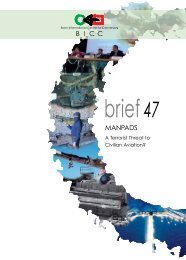egypt-final-presidential-elections-2012
egypt-final-presidential-elections-2012
egypt-final-presidential-elections-2012
Create successful ePaper yourself
Turn your PDF publications into a flip-book with our unique Google optimized e-Paper software.
The Carter Center<br />
Presidential Election in Egypt<br />
witnesses reported that in roughly 30 percent of<br />
polling stations, there were procedural errors observed<br />
during the second round of the election, as compared<br />
to nearly 50 percent of polling stations during the first<br />
round.<br />
Breaches of the Secrecy of<br />
the Vote: Breaches of the<br />
secrecy of the vote during<br />
the first round of voting<br />
were reported to have<br />
been witnessed in onethird<br />
of polling stations.<br />
The occurrences of similar<br />
breaches during the second<br />
round were reported in<br />
just over 10 percent of<br />
polling stations. The most<br />
common reason for breaches was placement of the<br />
polling booths in a way that did not ensure ballot<br />
secrecy. While the placement of ballot booths made<br />
it easier for anyone in the polling station to view a<br />
voter’s ballot, thereby reducing the secrecy of the<br />
ballot, it was seen by election officials as a justifiable<br />
move to prevent the likelihood of fraud. 159 There were<br />
also many cases where voters themselves voluntarily<br />
disclosed their choice to others, despite the availability<br />
of polling booths. Although these breaches did<br />
not appear to be intentional on the part of electoral<br />
officials, they were a cause of some concern, given<br />
that the right to secrecy of the vote is a key Egyptian<br />
international obligation. 160<br />
Regarding the secrecy of the vote, a serious<br />
concern was the inappropriate assistance in many<br />
cases that judges and other officials provided to<br />
illiterate voters. The Egyptian legal framework on<br />
the <strong>presidential</strong> election is silent with regard to<br />
assistance to illiterate voters. Many members of the<br />
judiciary considered it illegal and refused to provide<br />
assistance. 161 However, a number of presiding judges<br />
opted to provide assistance in such cases. Such assistance<br />
was often provided outside the polling booth,<br />
enabling anybody present in the polling station to<br />
witness the choice of the voter. The Carter Center<br />
There were also many cases where<br />
voters themselves voluntarily disclosed<br />
their choice to others, despite the<br />
availability of polling booths.<br />
strongly recommends that Egyptian legislators<br />
consider enacting into domestic legislation provisions<br />
for assistance to illiterate voters, in a way that allows<br />
similar assistance as that currently provided to visually<br />
impaired or disabled voters. 162<br />
Denial of the Right To<br />
Vote: Cases of voters not<br />
being allowed to vote were<br />
witnessed by The Carter<br />
Center in roughly 10 percent<br />
of polling stations, during<br />
both rounds. This was<br />
usually because the names of<br />
those voters did not appear<br />
on the voters’ lists or they<br />
were not able to provide<br />
sufficient proof of identity.<br />
In several cases when Carter Center witnesses were<br />
present, it was determined that voters were registered<br />
but were attempting to vote at the wrong polling<br />
station. In both rounds of voting, there were a few<br />
cases in which women in niqab who refused to be<br />
identified by the male judge were barred from being<br />
allowed to vote. Even though it is likely that few<br />
registered Egyptians were denied outright the opportunity<br />
to vote, it is essential that election officials<br />
do more to ensure that all voters are aware of the<br />
exact polling center and station to which they are<br />
assigned to vote and that all voters are educated on<br />
the requirements for voter identification once at the<br />
159 It is worth noting that the MoI instructed that voting booths be<br />
turned so that the voters voted with their backs facing the common<br />
polling station in the line of vision of the supervising judge. This was<br />
intended to prevent attempted voter fraud by reducing the risk that a<br />
voter could photograph his or her vote or switch a blank ballot with an<br />
already completed ballot brought from outside the polling station.<br />
160 U.N., ICCPR, Article 25 (b); U.N., UDHR, Article 21(3)<br />
161 The SJCE directed polling station judges not to provide assistance to<br />
illiterate voters during the course of the parliamentary <strong>elections</strong>.<br />
162 As of 2006, the World Bank reported that only 66 percent of<br />
Egyptians ages 15 and over are literate.<br />
55



